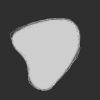Free Online Productivity Tools
i2Speak
i2Symbol
i2OCR
iTex2Img
iWeb2Print
iWeb2Shot
i2Type
iPdf2Split
iPdf2Merge
i2Bopomofo
i2Arabic
i2Style
i2Image
i2PDF
iLatex2Rtf
Sci2ools
ICIP
1999
IEEE
1999
IEEE
Uncertainties in Bayesian Geometric Models
Deformable geometric models fit very naturally into the context of Bayesian analysis. The prior probability of boundary shapes is taken to proportional to the negative exponential of the deformation energy used to control the boundary. This probabilistic interpretation is demonstrated using a Markov-Chain Monte-Carlo (MCMC) technique, which permits one to generate configurations that populate the prior. One of many uses for deformable models is to solve illposed tomographic reconstruction problems, which we demonstrate by reconstructing a two-dimensional object from two orthogonal noisy projections. We show how MCMC samples drawn from the posterior can be used to estimate uncertainties in the location of the edge of the reconstructed object.
Deformable Geometric Models | Deformable Models | ICIP 1999 | Image Processing | Orthogonal Noisy Projections |
Related Content
| Added | 25 Oct 2009 |
| Updated | 26 Oct 2009 |
| Type | Conference |
| Year | 1999 |
| Where | ICIP |
| Authors | Kenneth M. Hanson, Gregory S. Cunningham, Robert J. McKee |
Comments (0)

